七年级上册期末考试专题复习一般现在时
七年级英语上册一般现在时练习及答案
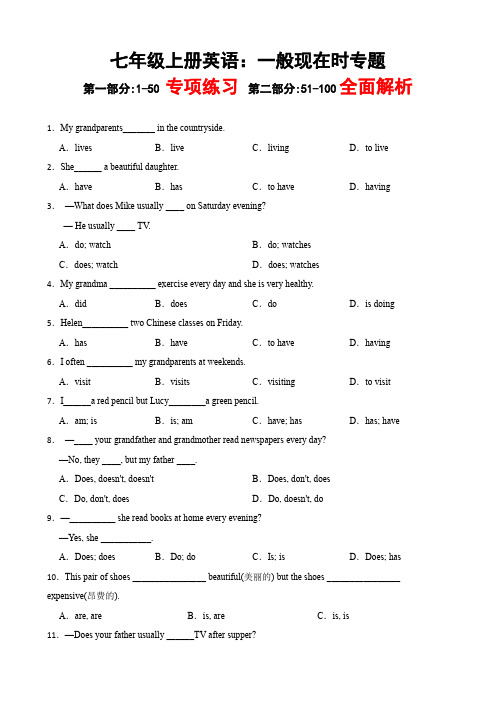
七年级上册英语:一般现在时专题第一部分:1-50 专项练习第二部分:51-100全面解析1.My grandparents_______ in the countryside.A.lives B.live C.living D.to live 2.She______ a beautiful daughter.A.have B.has C.to have D.having 3.—What does Mike usually ____ on Saturday evening?— He usually ____ TV.A.do; watch B.do; watchesC.does; watch D.does; watches4.My grandma __________ exercise every day and she is very healthy.A.did B.does C.do D.is doing 5.Helen__________ two Chinese classes on Friday.A.has B.have C.to have D.having6.I often __________ my grandparents at weekends.A.visit B.visits C.visiting D.to visit7.I______a red pencil but Lucy________a green pencil.A.am; is B.is; am C.have; has D.has; have 8.—____ your grandfather and grandmother read newspapers every day?—No, they ____, but my father ____.A.Does, doesn't, doesn't B.Does, don't, doesC.Do, don't, does D.Do, doesn't, do9.—__________ she read books at home every evening?—Yes, she ___________.A.Does; does B.Do; do C.Is; is D.Does; has 10.This pair of shoes ________________ beautiful(美丽的) but the shoes ________________ expensive(昂费的).A.are, are B.is, are C.is, is11.—Does your father usually ______TV after supper?—No, he usually _______ newspapers.A.watch; reads B.sees; reads C.watch; looks D.see; looks 12.He ______ playing baseball, but he always ______ baseball games on TV.A.don't like; watch B.doesn't like; watchC.doesn't like; watches D.isn't like; watch13.My friend and I _______________ Japanese cartoons.A.both like B.like both C.are both like D.are like both 14.Angela to school at 7:00 every day, but yesterday she to school at 6:40.A.goes; went B.goes; goes C.went; goes D.went; went 15.—Excuse me, do you know when Tom _______ home tomorrow?—Sorry, I don't know. When he __________ home, I will tell him to call you back.A.will return; will comeB.return; will comeC.will return; comes16.Alice usually _____ home at 5:30, but yesterday she ________ home late.A.get; got B.get; gets C.gets; got D.gets; gets 17.Mike _________ fast. Look! He________ faster than Tom.A.runs; run B.run; runC.runs; is running D.run; running18.My brother Jack a new picture book.A.have B.has C.do D.does 19.Both Mike and I ready for the new middle school life.A.be B.am C.is D.are 20.—Does your pen pal _________ a pet dog?—No. He _________ a cute cat.A.have;have B.has;has C.has;have D.have;has 21.Classes__________ at 5:00 p.m. from Monday to Friday.A.finishes B.finishing C.finish D.to finish 22.He ____ a small room. ____ a table in the room.A.has; There is B.has; Has C.is; There is 23.Lucy ____ ice cream, but she doesn't ____ salad.A.likes; likes B.like; like C.likes; like 24.Mike usually________basketball with his friends afterschool.A.play B.plays C.is playing25._______ Peter often visit his grandparents at weekends?A.Do B.Does C.Is D.Are 26.Li Lei ______ sports on TV every day.A.watch B.watches C.look D.looks 27.There______________ more and more foreigners learning Chinese now.A.is B.are C.was D.were 28.—Do you___________ an American friend?—No, I don't. But my sister___________ one.A.have; has B.has; have C.have; have D.has; has 29.Gina___________ a Chinese dictionary.A.doesn't has B.have C.doesn't have D.don't have 30.Lily___________ her CD to her classmate.A.borrow B.lend C.borrows D.lends 31.My mother _____ in a shop. She _____ now.A.works, working B.work, is workingC.works, is working D.work, work32.The shorts _________very nice. I'll take ________.A.look; them B.looks; it C.look; it D.looks; them 33.I a red pencil but Lucy a green pencil.A.am, is B.is, am C.have, has D.has, have 34.That man __________ old, but he is not that old.A.sounds B.looks C.thinks D.sees 35.My mum likes cakes and bread, so she often _______ by herself.A.bake B.bakes C.baking D.to bake 36.There _______ a set of keys on the desk. Some books ______ on the desk, too.A.is; are B.is; is C.are; are D.are; is 37.— ________ Kate ________ blue eyes? — Yes, she does.A.Is, have B.Do, has C.Does, have D.Do, have38.At weekends, Simon always _____ for half an hour.A.go running B.go to run C.goes to run D.goes running 39.He doesn't _____ a big head but his feet ______ big.A.has;is B.have;is C.have;are40.Jane _______________to the library every morning.A.go B.going C.goes41.My husband always me flowers every week before we got married, but now he never .A.sent; does B.send; doesC.was going to send; do D.sent; do42.You buy anything because we have got enough for the picnic.A.needn't to B.don't need to C.need to D.don't need 43.We each ________ WeChat nowadays, even the old people.A.play B.plays C.playing D.played 44.Mary __________ to help others.A.always is ready B.is always readyC.always D.always ready45.He ________ to school because his home is far away from his school.A.seldom walk B.seldom walks C.always walk D.always walks 46.— _________ his mother _________ in the supermarket?—_____________.A.Does…work; No, she doesn't B.Does…works; Yes, she do.C.Does…work; No, she does D.Does…works; Yes, she don't47.This pair of boots match my skirt. Can I try on that pair?A.doesn't B.don't C.isn't D.aren't48.I ________ you ________ with us tomorrow.A.will hope; to go B.hope; to goC.will hope; can go D.hope; can go49.We can go on a trip if it _____________ tomorrow.A.will not rain B.rain C.don't rain D.doesn't rain 50.He with his parents often________________________ dinner at home.A.have B.has C.to have D.having答案解析1.B2.B3.B4.B5.A6.A7.C8.C9.A10.B11.A12.C13.A14.A15.C16.C17.C18.B19.D20.D21.C22.A23.C24.B25.B 26.B 27.B 28.A 29.C 30.D 31.C 32.A 33.C 34.B 35.B 36.A 37.C 38.D 39.C 40.C 41.A 42.B 43.A 44.B 45.B 46.A 47.A 48.D 49.D 50.B七年级上册英语:一般现在时专题第一部分:1-50 专项练习第二部分:51-100全面解析1.My grandparents_______ in the countryside.A.lives B.live C.living D.to live全面解析:我的祖父母住在农村。
【必刷题】2024七年级英语上册一般现在时态专项专题训练(含答案)

【必刷题】2024七年级英语上册一般现在时态专项专题训练(含答案)试题部分一、选择题:1. He _______ (go) to school bus every day.A. goesB. goes toC. goingD. go2. My mother _______ (cook) dinner at 7 p.m. every evening.A. cookB. cooksC. is cookingD. cooked3. We _______ (watch) a movie on weekends.A. watchB. watchesC. watchingD. is watching4. She _______ (visit) her grandparents once a month.A. visitB. visitsC. is visitingD. visited5. They _______ (play) soccer in the afternoon.A. playsB. playC. is playingD. played6. It _______ (rain) a lot in summer.A. rainsB. rainC. rainedD. is raining7. He _______ (do) his homework every evening.A. doB. doesC. doingD. did8. She _______ (have) breakfast at 7 a.m. every morning.A. haveB. hasC. havingD. had9. We _______ (read) books before going to bed.A. readB. readsC. readingD. is reading10. They _______ (travel) to different countries every year.A. travelB. travelsC. is travelingD. traveled二、判断题:1. 一般现在时态表示经常发生的动作或习惯性的行为。
人教版七年级英语上册语法专项_一般现在时
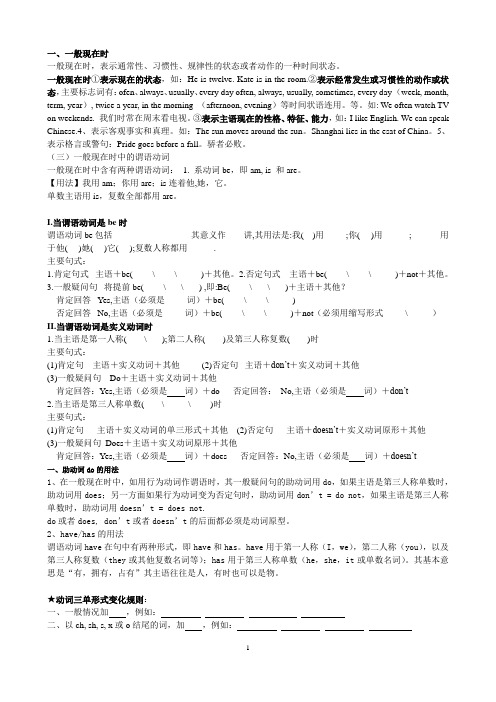
一、一般现在时一般现在时,表示通常性、习惯性、规律性的状态或者动作的一种时间状态。
一般现在时①表示现在的状态,如:He is twelve. Kate is in the room.②表示经常发生或习惯性的动作或状态,主要标志词有:ofen、always、usually、every day often, always, usually, sometimes, every day (week, month, term, year), twice a year, in the morning (afternoon, evening)等时间状语连用。
等。
如: We often watch TV on weekends. 我们时常在周末看电视。
③表示主语现在的性格、特征、能力,如:I like English. We can speak Chinese.4、表示客观事实和真理。
如:The sun moves around the sun。
Shanghai lies in the esat of China。
5、表示格言或警句:Pride goes before a fall。
骄者必败。
(三)一般现在时中的谓语动词一般现在时中含有两种谓语动词: 1. 系动词be,即am, is 和are。
【用法】我用am;你用are;is连着他,她,它。
单数主语用is,复数全部都用are。
I.当谓语动词是be时谓语动词be包括____ _____ _____ 其意义作____讲,其用法是:我( )用_____;你( )用______; ______用于他( )她( )它( );复数人称都用______.主要句式:1.肯定句式主语+be( ____\ ____\ _____)+其他。
2.否定句式主语+be( ____\ ____\ _____)+not+其他。
3.一般疑问句将提前be( ____\ ___\ ___) ,即:Be( ____\ ___\ ___)+主语+其他?肯定回答Yes,主语(必须是_____词)+be( ____\ ____\ _____)否定回答No,主语(必须是_____词)+be( ____\ ____\ _____)+not(必须用缩写形式____\ _____)II.当谓语动词是实义动词时1.当主语是第一人称(____\ ___);第二人称(____)及第三人称复数(____)时主要句式:(1)肯定句主语+实义动词+其他(2)否定句主语+don’t+实义动词+其他(3)一般疑问句Do+主语+实义动词+其他肯定回答:Yes,主语(必须是词)+do 否定回答:No,主语(必须是词)+don’t2.当主语是第三人称单数(____\ _____\ ____)时主要句式:(1)肯定句主语+实义动词的单三形式+其他(2)否定句主语+doesn’t+实义动词原形+其他(3)一般疑问句Does+主语+实义动词原形+其他肯定回答:Yes,主语(必须是词)+does 否定回答:No,主语(必须是词)+doesn’t一、助动词do的用法1、在一般现在时中,如用行为动词作谓语时,其一般疑问句的助动词用do,如果主语是第三人称单数时,助动词用does;另一方面如果行为动词变为否定句时,助动词用don’t = do not,如果主语是第三人称单数时,助动词用doesn’t = does not.do或者does, don’t或者doesn’t的后面都必须是动词原型。
人教版丨七年级上册英语语法专题复习(附练习题及答案)
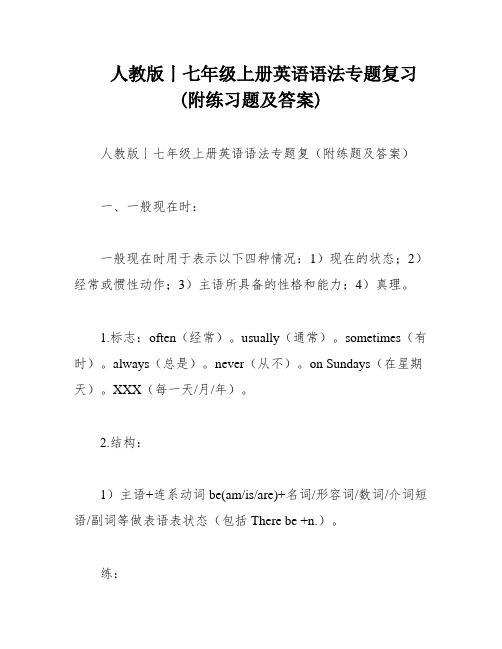
人教版丨七年级上册英语语法专题复习(附练习题及答案)人教版丨七年级上册英语语法专题复(附练题及答案)一、一般现在时:一般现在时用于表示以下四种情况:1)现在的状态;2)经常或惯性动作;3)主语所具备的性格和能力;4)真理。
1.标志:often(经常)。
usually(通常)。
sometimes(有时)。
always(总是)。
never(从不)。
on Sundays(在星期天)。
XXX(每一天/月/年)。
2.结构:1)主语+连系动词be(am/is/are)+名词/形容词/数词/介词短语/副词等做表语表状态(包括There be +n.)。
练:1.I am a student。
My name is Tom.2.Where are my shoes。
They are here.3.Who is the girl with long straight hair。
I think she is Kate.4.You and I are not in Class Six.5.XXX。
Yes。
there is.6.XXX。
No。
they aren't.2)主语(非第三人称单数)+行为动词原形+其他(用助动词do帮助构成否定句、一般疑问句和特殊疑问)。
3)主语(第三人称单数)+行为动词的第三人称单数+其他(用助动词does帮助构成否定句、一般疑问句和特殊疑问句)。
行为动词第三人称单数加-s的形式:1.-s2.辅音+y: study-studies3.以s,x,ch,sh结尾: watch-watches。
XXX4.特殊: have-has。
do-does。
go-goes。
练:1.His parents watch TV every night.肯定句:1.XXX.否定句:2.His parents do not watch TV every night.n: My brother does not do homework every day。
初一英语语法专练1(一般现在时、一般过去时、现在进行时)
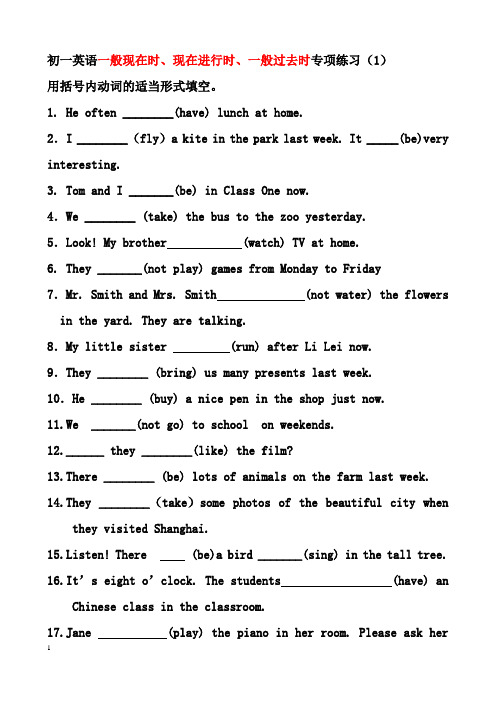
初一英语一般现在时、现在进行时、一般过去时专项练习(1)用括号内动词的适当形式填空。
1. He often ________(have) lunch at home.2.I ________(fly)a kite in the park last week. It _____(be)very interesting.3. Tom and I _______(be) in Class One now.4.We ________ (take) the bus to the zoo yesterday.5.Look! My brother (watch) TV at home.6. They _______(not play) games from Monday to Friday7.Mr. Smith and Mrs. Smith (not water) the flowers in the yard. They are talking.8.My little sister (run) after Li Lei now.9.They ________ (bring) us many presents last week.10.He ________ (buy) a nice pen in the shop just now.11.We _______(not go) to school on weekends.12.______ they ________(like) the film?13.There ________ (be) lots of animals on the farm last week.14.They ________(take)some photos of the beautiful city whenthey visited Shanghai.15.Listen! There (be)a bird _______(sing) in the tall tree.16.It’s eight o’clock. The students (have) anChinese class in the classroom.17.Jane (play) the piano in her room. Please ask herto come here.18.What _______you usually _______(do) on Sundays?19. _______ your parents _______(read) newspapers every day?20.Miss Li sometimes _______(teach) us to play games.21— he (sit) in the front of the classroom?—No, he isn’t.22.Mr. Black (come) to Beijing one month ago.23.—What you (look) for, Ann?—My pencil. Where is it?24.The man often _____(go)out for a walk with his dog last year.25.__________ (be) there any water in the glass last night?26.Jim ________(cook)supper for me yesterday evening.st Sunday, she ________ (climb) hills with her sister.28. My brother and I ________(go )shopping on Sundays29.There ________(be) some milk in the bottle.30.She _______(like) reading novels.31.My son _______(do ) his homework every evening.32.They _________(make)many cards yesterday.33.His father ______(stop) the car and took him home.34.Her uncle_______(drive) his car to Chongqing now.35. My mother often_______(cook) nice food for us.36. The student always _______(read)English every morning.37. Li Hua _______(do not) like math because it is too difficult.38.—Where is Mr. Brown?—Oh, he (watch) the flowers in the garden.39.The child often _______(listen) to music in the evening.40. -What _______(be) the weather like today? - It’s cool.41.She never________ (get) up at six o'clock.42.The children ________(make) five kites yesterday.43.Liming________ (get) a letter from his old friend last Wednesday.44.I ________ (buy) a new watch on my twelfth birthday last year.45. What ________(do) she usually ________ (do) after school?46. Lucy ______ (study) English, Chinese, math and so on atschool.47.My father ______ (write) a new book now.48.Some girls ______ (have) a great time last weekend.49.Be quiet! The baby (sleep) in the next room.50.Tom with his parents ______(clean)the floor now, but Janeand her parents _______(listen) to music.51.Look! Mike (play) the computer games.52. Tom often (use) the computer to study Chinese?53.Listen! A girl (sing) Chinese song in the classroom.54.It’s seven o’clock in the evening. Many old people(dance) on the square.55.- your mother (cook) dinner every evening? -Yes, she . Now she dinner in the kitchen.。
七年级英语一般现在时练习及答案
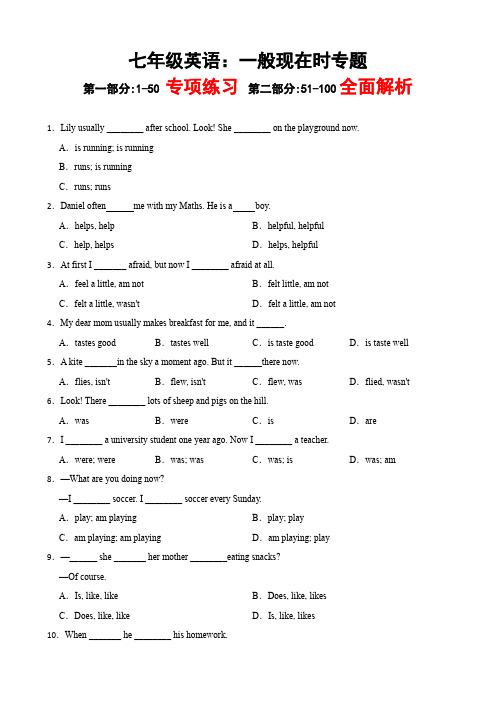
七年级英语:一般现在时专题第一部分:1-50 专项练习第二部分:51-100全面解析1.Lily usually ________ after school. Look! She ________ on the playground now.A.is running; is runningB.runs; is runningC.runs; runs2.Daniel often me with my Maths. He is a boy.A.helps, help B.helpful, helpfulC.help, helps D.helps, helpful3.At first I _______ afraid, but now I ________ afraid at all.A.feel a little, am not B.felt little, am notC.felt a little, wasn't D.felt a little, am not4.My dear mom usually makes breakfast for me, and it ______.A.tastes good B.tastes well C.is taste good D.is taste well 5.A kite _______in the sky a moment ago. But it ______there now.A.flies, isn't B.flew, isn't C.flew, was D.flied, wasn't 6.Look! There ________ lots of sheep and pigs on the hill.A.was B.were C.is D.are7.I ________ a university student one year ago. Now I ________ a teacher.A.were; were B.was; was C.was; is D.was; am 8.—What are you doing now?—I ________ soccer. I ________ soccer every Sunday.A.play; am playing B.play; playC.am playing; am playing D.am playing; play9.—______ she _______ her mother ________eating snacks?—Of course.A.Is, like, like B.Does, like, likesC.Does, like, like D.Is, like, likes10.When _______ he ________ his homework.A.does ,does B.does ,do C.do ,does D.do ,do 11.—What time _____ Rick _____ his homework?—At six thirty.A.do; do B.do; does C.does; does D.does ;do 12.There _______ any classes tomorrow if there ______ too much snow.A.isn't going to be; is going to beB.isn't going to have; isC.aren't going to be; isD.aren't going to be; is going to be13.The girl ________ black hair and she ________ of medium height.A.has; has B.is; has C.has; is D.is; is 14.Mike will give you a call if he __________ some new information.A.will get B.is getting C.gets D.got 15.The twins usually have milk and bread for breakfast, but Jim often________ some coffee for it.A.have B.has C.had D.is having 16.— Where ______ you come from?— I ______ from China.A.are, am B.do, am C.are, do D.do, do 17.Mike is a good boy. He _____late for school.A.not be B.isn't C.isn't be D.aren't 18.He______ very busy this week, but he ______ free next week.A.will be, is B.is, isC.will be, will be D.is, will be19.—Mum, I watched TV for only forty minutes. Sometimes TV is good for us.—Forty minutes enough. Now you must do your homework.A.watch;is B.watching;is C.watched;are 20.He _____ very busy this week, but he ______ free next week.A.will be; is B.is; isC.will be; will be D.is; will be21.Look! There a lot of money in the box.A.is B.are C.was D.were22.He often his homework at home.A.lose B.loses C.leave D.leaves 23.Wow! Everything half price. That is too great.A.am B.is C.are D.be 24.The United States in North America.A.lay B.lie C.lies25.—_______you play the piano?— Yes, I can.A.Need B.Can C.Could D.May 26.Jack ______sing. He is dumb. (哑的)A.couldn't B.mustn't C.can't D.needn't 27.My mom often cakes and she a strawberry cake for me yesterday.A.make; made B.makes; made C.made; make 28.My uncle ________ of medium height and ________ short black hair.A.has; is B.has; has C.is; has29.— If Alice ________ the skating club, I will buy her a pair of skating shoes.—Wow. You are a good uncle. You are very good _______ children.A.joins; with B.joined; with C.joins; at D.joined; at 30.—How do you usually go to school?—I ________ to school on foot.A.go B.went C.was going D.will go 31.Although Bill isn't rich enough, he often _______ money to the poor.A.will give B.is giving C.gives D.gave 32.If it ______tomorrow, we can go to the farm.A.will not rain B.didn't rain C.isn't raining D.doesn't rain 33.He likes to sleep with the windows ____________ in summer.A.open B.opened C.opening D.opens 34.What club _________ you want to join?A.are B.does C.can D.do 35.We ________ for a picnic if it __________rain this Sunday.A.will go, doesn't B.will go, won't go C.go, doesn't36.Everything in the house new.I like to live here.A.is B.are C.were D./37.My grandmother usually _____ up first in our family.A.get B.getting C.gets D.got38.He often helps me ________ my homework.A.to doing B.doing C.does D.do39.Our knowledge of computers ________growing all the time.A.be B.is C.are D.were40.I often _______.She is very kind.A.miss Mr. Liu B.miss Miss LiuC.am missing Miss Liu D.am missing Mr. Liu41.One of my friends__________in America. I miss her so much.A.live B.lives C.living D.to live 42.Usually we to say goodbye in China.A.will wave B.wave C.waved D.are waving 43.If our government ______ attention to controlling food safety now, our health ______ in danger.A.won't pay; is B.doesn't pay; wasC.won't pay; will be D.doesn't pay; will be44.— What do you think of the news?—The news ________ terrible. But we are ________ in it.A.sound, interested B.sounds, interestingC.sounds, interested D.is sounding, interested45.Bob usually to school early,but this morning he to school late.A.gets;got B.gets;gets C.got;gets D.got;got 46.One of them from Africa.A.come B.coming C.are D.is 47.What time ______ Tom _________ breakfast every day?A.do, have B.is, having C.does, have D.are, having 48.She is going to be a pilot when she _______.A.will grow up B.grows up C.grow up D.grew up 49.Tom ________ play the guitar now,but he ________ do it at all 3 years ago.A.can,can't B.could,couldn't C.can,couldn't 50.The soup _____. Both of them_____it carefully now.A.smells good; tasteB.smell good; tastingC.smells good; are tasting答案解析部分1.B 2.D 3.D 4.A 5.B 6.D 7.D 8.D 9.C 10.B 11.D 12.C 13.C 14.C 15.B 16.B 17.B 18.D19.B20.D21.A22.D23.B24.C25.B26.C27.B28.C29.A30.A31.C32.D33.A34.D35.A36.A37.C38.D39.B40.B41.B42.B43.D44.C45.A46.D47.C48.B49.C50.C七年级英语:一般现在时专题第一部分:1-50 专项练习第二部分:51-100全面解析1.Lily usually ________ after school. Look! She ________ on the playground now.A.is running; is runningB.runs; is runningC.runs; runs全面解析:莉莉通常放学后跑步。
初一英语一般现在时单选题40题

初一英语一般现在时单选题40题1. Tom often ______ his homework after dinner.A. doB. doesC. doingD. to do答案:B。
本题考查一般现在时中主语为第三人称单数时动词的变化形式。
Tom 是第三人称单数,所以动词要用does。
选项 A do 是动词原形,用于主语是非第三人称单数的情况;选项C doing 是现在分词,不能直接作谓语;选项D to do 是动词不定式,也不能作谓语。
2. My sister ______ to school by bike every day.A. goB. goesC. goingD. to go答案:B。
在一般现在时中,my sister 是第三人称单数,动词要用goes。
选项 A go 是动词原形,不符合主语为第三人称单数的用法;选项C going 是现在分词,不能单独作谓语;选项D to go 是动词不定式,不能作谓语。
3. The teacher ______ very kind.A. isB. areD. be答案:A。
The teacher 是第三人称单数,所以be 动词用is。
选项B are 用于复数主语;选项C am 用于第一人称I;选项D be 是动词原形,不能直接作谓语。
4. He ______ football on weekends.A. playB. playsC. playingD. to play答案:B。
He 是第三人称单数,动词要用plays。
选项A play 是动词原形;选项C playing 是现在分词;选项D to play 是动词不定式,均不符合一般现在时中主语为第三人称单数的用法。
5. Lucy ______ music very much.A. likeB. likesC. likingD. to like答案:B。
Lucy 是第三人称单数,动词like 要加s 变成likes。
外研版英语七年级上学期语法专题复习 一般现在时用法及练习(答案含解析)
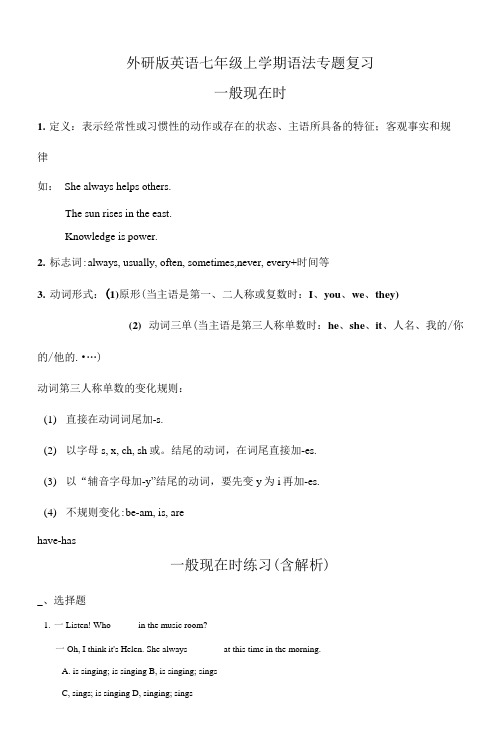
外研版英语七年级上学期语法专题复习一般现在时1.定义:表示经常性或习惯性的动作或存在的状态、主语所具备的特征;客观事实和规律如:She always helps others.The sun rises in the east.Knowledge is power.2.标志词:always, usually, often, sometimes,never, every+时间等3.动词形式:(1)原形(当主语是第一、二人称或复数时:I、you、we、they)(2)动词三单(当主语是第三人称单数时:he、she、it、人名、我的/你的/他的.•…)动词第三人称单数的变化规则:(1)直接在动词词尾加-s.(2)以字母s, x, ch, sh或。
结尾的动词,在词尾直接加-es.(3)以“辅音字母加-y”结尾的动词,要先变y为i再加-es.(4)不规则变化:be-am, is, arehave-has一般现在时练习(含解析)_、选择题1.一Listen! Who _____ in the music room?一Oh, I think it's Helen. She always ________ a t this time in the morning.A. is singing; is singing B, is singing; singsC, sings; is singing D, singing; sings2.— ____ the cat _______ l ovely?正在做某事情,时态上倾向于选择现在进行时态。
根据句意,你的弟弟每天都使用他的电脑吗?是的,他现在正在使用它。
【知识点】少数以。
结尾、肯定句、一般疑问句及其回答20.【答案】D【解析】考查动词。
句意:——大卫怎样去学校?——他经常骑自行车去学校。
他住得离学校有点远。
句子主语he是第三人称单数,因此谓语也要用第三人称单数形式,排除A、B o骑自行车要用动词ride。
(必考题)初中英语七年级上册期末复习题(含答案解析)

一、选择题1.He took a rocket and launched it. The rocket disappeared into the ______.A.star B.earth C.sky D.moon C解析:C【详解】句意:他拿起一枚火箭,发射出去,火箭消失在天空中。
star星星;earth地球;sky天空;moon月球。
句中rocket是火箭,根据launched it可知,火箭应该是在天空中,故应选C。
2.--- I'm very tired. What can I do?--- ___________listening to music?A.Why not B.Why do you C.What about D.Why don't you C解析:C【解析】【详解】句意:-我很累,我能做什么?-听音乐怎么样?Why not…?为什么不…?后跟动词原形;Why do you…?你为什么…?后跟动词原形;What about…? …怎么样?后跟动名词形式;Why don’t you…? 你为什么不…?后跟动词原形。
根据空后的listening to music可知,应选C。
3.--- Can you meet me ________ Friday afternoon?--- Sure. I’ll be _______ then.A.in; busy B.on; busy C.in; free D.on; free D解析:D【解析】【详解】句意:-你能在周五下午跟我见面吗?-当然,我那个时候有空。
in泛指在上午、下午或晚上、年代、月份;on特指是某一天的上午、下午或者晚上;busy忙的;free空闲的。
第一个空后是具体一天的下午,故用on;回答Sure是肯定的,说明那个时间有空,故应选D。
4.---There’re some skirts _______ red for only $ 15 in that new clothes store.--- Really? Let’s go and have a look.A.on B.in C.with D.for B解析:B【解析】【详解】句意:-在那个新开的服装店里有一些红色的裙子,只卖15美元。
一般现在时60题(知识详解+真题训练)七年级英语上学期期末复习查缺补漏冲刺满分 (人教版)

人教版七年级上册期末复习查缺补漏冲刺满分(重点知识+难点易错点)专题09 重点语法一般现在时一、概念1.表示经常性或习惯性的动作,常与表示频度的时间状语连用。
如:always, usually, often, sometimes, seldom(很少), never(决不), every day, at 8:30, on Sunday,in the morning等。
如:I always get up at 6:00 in the morning.2.表示现在时刻的状态、能力、性格、个性。
如:She loves English very much.My sister can play the piano very well.3.表示客观的事实。
如:The sun rises in the east. 太阳从东方升起。
4.格言或警句。
如:Pride goes before a fall.骄者必败。
二、句子结构1.如果句子主语的人称是I, we, you, they或复数名词时,动词用动词原形。
如:We often go home by bus.2.如果句子的主语是第三人称单数,即:he, she, it 或单数名词时,动词要用第三人称的单数形式。
如:He often goes home by bus.三、动词的第三人称单数形式的构成规则如下:1.一般情况下在动词的后面直接加“s”;如:work→works play→plays rain→rains see→sees visit→visits2.以o, x,s,sh, ch结尾的动词,在后面加“es”;如:do→does fix→fixes guess→guesses wash→washes teach→teaches3.以辅音字母加y结尾的动词,先把“y”改为“i”, 再加“es”;如:fly→flies study→studies carry→carries4.不规则变化。
人教版新目标英语七年级上语法总复习:一般现在时
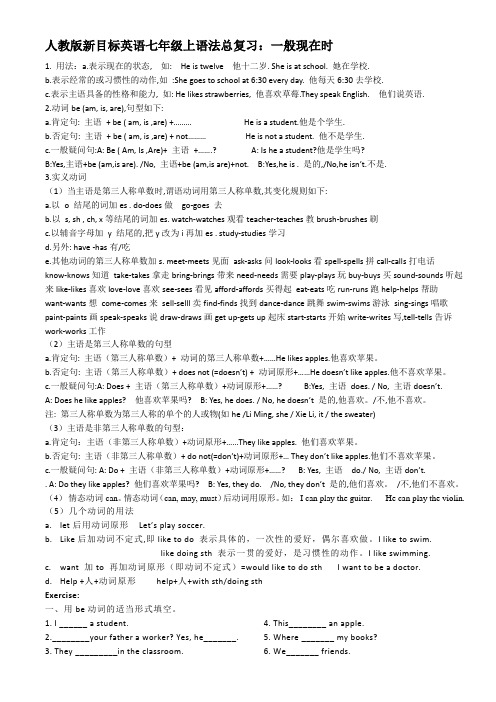
人教版新目标英语七年级上语法总复习:一般现在时1. 用法:a.表示现在的状态, 如: He is twelve 他十二岁. She is at school. 她在学校.b.表示经常的或习惯性的动作,如:She goes to school at 6:30 every day. 他每天6:30去学校.c.表示主语具备的性格和能力, 如: He likes strawberries, 他喜欢草莓.They speak English. 他们说英语.2.动词be (am, is, are),句型如下:a.肯定句: 主语+ be ( am, is ,are) +………He is a student.他是个学生.b.否定句: 主语+ be ( am, is ,are) + not………He is not a student. 他不是学生.c.一般疑问句:A: Be ( Am, Is ,Are)+ 主语+…….? A: Is he a student?他是学生吗?B:Yes,主语+be (am,is are). /No, 主语+be (am,is are)+not. B:Yes,he is . 是的,/No,he isn’t.不是.3.实义动词(1)当主语是第三人称单数时,谓语动词用第三人称单数,其变化规则如下:a.以o 结尾的词加es . do-does做go-goes 去b.以s, sh , ch, x等结尾的词加es. watch-watches观看teacher-teaches教brush-brushes刷c.以辅音字母加y 结尾的,把y改为i再加es . study-studies学习d.另外: have -has有/吃e.其他动词的第三人称单数加s. meet-meets见面ask-asks问look-looks看spell-spells拼call-calls打电话know-knows知道take-takes拿走bring-brings带来need-needs需要play-plays玩buy-buys买sound-sounds听起来like-likes喜欢love-love喜欢see-sees看见afford-affords买得起eat-eats吃run-runs跑help-helps帮助want-wants想come-comes来sell-selll卖find-finds找到dance-dance跳舞swim-swims游泳sing-sings唱歌paint-paints画speak-speaks说draw-draws画get up-gets up起床start-starts开始write-writes写,tell-tells告诉work-works工作(2)主语是第三人称单数的句型a.肯定句: 主语(第三人称单数)+ 动词的第三人称单数+……He likes apples.他喜欢苹果。
牛津译林七年级上册一般现在时专题梳理和练习
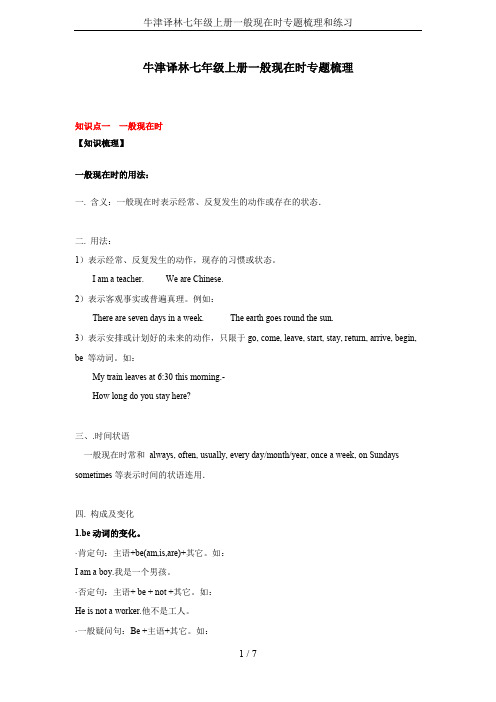
牛津译林七年级上册一般现在时专题梳理知识点一一般现在时【知识梳理】一般现在时的用法:一. 含义:一般现在时表示经常、反复发生的动作或存在的状态.二. 用法:1)表示经常、反复发生的动作,现存的习惯或状态。
I am a teacher. We are Chinese.2)表示客观事实或普遍真理。
例如:There are seven days in a week. The earth goes round the sun.3)表示安排或计划好的未来的动作,只限于go, come, leave, start, stay, return, arrive, begin, be 等动词。
如:My train leaves at 6:30 this morning.-How long do you stay here?三、.时间状语一般现在时常和always, often, usually, every day/month/year, once a week, on Sundays sometimes等表示时间的状语连用.四. 构成及变化1.be动词的变化。
·肯定句:主语+be(am,is,are)+其它。
如:I am a boy.我是一个男孩。
·否定句:主语+ be + not +其它。
如:He is not a worker.他不是工人。
·一般疑问句:Be +主语+其它。
如:-Are you a student?·肯定回答:-Yes. I am. /否定回答:No, I'm not.·特殊疑问句:疑问词+一般疑问句。
如:Where is my bike?2. 行为动词的变化。
1)、行为动词在一般现在时中的用法:一般人称的谓语动词用原形.,但单数第三人称做主语时谓语动词词尾发生变化:即.动词词尾加-s;或.-es,动词遇到单数第三人称时的表示方法在一般现在时中, 当主语是单数第三人称时, 行为动词的形式是在词尾加-s 或–es具体方法如下:(1)多数动词直接加s:runs gets likes collets takes plays climbs…….(2)结尾是s, x, sh, ch, o,前为辅音字母,结尾加es :watches teaches goes does washes crosses mixes brushes(3)动词末尾y前为辅音:将y改为i加es: study→studies fly→fliescarry→carries cry→cries但在y前如果为元音则直接加s:buys says2、.否定形式:主语是第三人称单数,在行为动词前加doesn’t. 行为动词变为原形。
上册初中七年级英语 动词时态专项训练(100题)
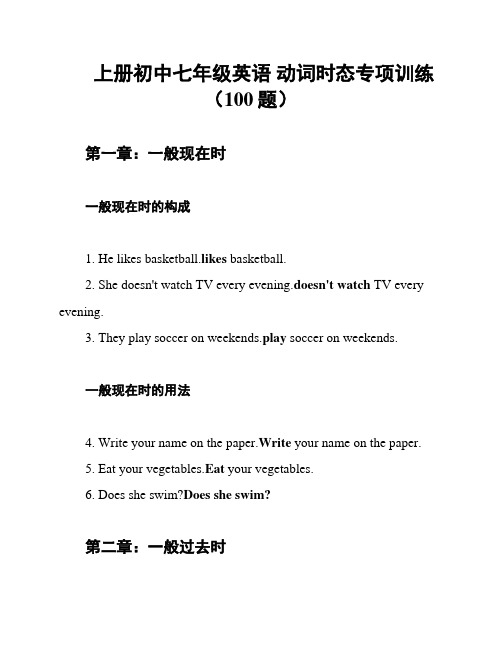
上册初中七年级英语动词时态专项训练(100题)第一章:一般现在时一般现在时的构成1. He likes basketball.likes basketball.2. She doesn't watch TV every evening.doesn't watch TV every evening.3. They play soccer on weekends.play soccer on weekends.一般现在时的用法4. Write your name on the paper.Write your name on the paper.5. Eat your vegetables.Eat your vegetables.6. Does she swim?Does she swim?第二章:一般过去时一般过去时的构成7. He ate pizza for lunch.ate pizza for lunch.8. She didn't go to the party last night.didn't go to the party last night.9. They played video games yesterday.played video games yesterday.一般过去时的用法10. Walked you to school yesterday?Walked you to school yesterday?11. Did he finish his homework?Did he finish his homework?12. Were they there when I called?Were they there when I called?第三章:一般将来时一般将来时的构成13. He will buy a new car.will buy a new car.14. She won't travel to Europe this summer.won't travel to Europe this summer.15. They are going to study abroad.are going to study abroad.一般将来时的用法16. Will you help me with this?Will you help me with this?17. Are they flying to New York?Are they flying to New York?18. Is he planning to attend the conference?Is he planning to attend the conference?第四章:现在进行时现在进行时的构成19. He is reading a book.is reading a book.20. She is cooking dinner.is cooking dinner.21. They are playing basketball.are playing basketball.现在进行时的用法22. Are you listening to me?Are you listening to me?23. Is he running late?Is he running late?24. Are they waiting for the bus?Are they waiting for the bus?第五章:过去进行时过去进行时的构成25. He was sleeping when I called.was sleeping when I called.26. She was walking in the park.was walking in the park.27. They were watching a movie.were watching a movie.过去进行时的用法28. Were you studying last night?Were you studying last night?29. Was he playing football?Was he playing football?30. Were they singing in the classroom?Were they singing in the classroom?第六章:现在完成时现在完成时的构成31. He has finished his homework.has finished his homework.32. She has visited Paris twice.has visited Paris twice.33. They have played soccer for an hour.have played soccer for an hour.现在完成时的用法34. Have you seen the movie?Have you seen the movie?35. Has he called you back?Has he called you back?36. Have they finished their project?Have they finished their project?第七章:过去完成时过去完成时的构成37. He had finished his meal before the meeting.had finished his meal before the meeting.38. She had visited the museum earlier in the day.had visited the museum earlier in the day.39. They had played basketball for an hour before the game.had played basketball for an hour before the game.过去完成时的用法40. Had you finished your homework before the teacher collected it?Had you finished your homework before the teacher collected it?41. Had he left the office before you arrived?Had he left the office before you arrived?42. Had they started the meeting when you arrived?Had they started the meeting when you arrived?第八章:被动语态被动语态的构成43. The book was written by him.was written by him.44. The cake was baked by her.was baked by her.45. The report was prepared by them.was prepared by them.被动语态的用法46. Was the window cleaned?Was the window cleaned?47. Were the tables set?Were the tables set?48. Was the presentation reviewed?Was the presentation reviewed?第四章:情态动词情态动词的用法49. He can swim.can swim.50. She may attend the party.may attend the party.51. They must finish their work.must finish their work.第五章:动词短语动词短语的用法52. He break the record.break the record.53. She call her friend.call her friend.54. They eat pizza.eat pizza.第六章:动词辨析动词辨析的用法55. He run faster than me.run faster than me.56. She jump over the fence.jump over the fence.57. They dance at the party.dance at the party. 答案答案解析- 答案:1. likes 2. doesn't watch 3. plays 4. Write 5. Eat 6. Does she swim? 7. ate 8. didn't go 9. played 10. walked 11. did he finish 12. were they there 13. will buy 14. won't travel 15. are going to study 16. will you help 17. are they flying 18. is he planning 19. is reading 20. is cooking 21. are playing 22. are you listening 23. is he running 24. are they waiting 25. was sleeping 26. was walking 27. were watching 28. were you studying 29. was he playing 30. were they singing 31. has finished 32. has visited 33. have played 34. have you seen 35. has he called 36. have they finished 37. had finished 38. had visited 39. had played 40. had you finished 41. had he left 42. had they started 43. was written 44. was baked 45. was prepared 46. was the window cleaned 47. were the tables set 48. was the presentation reviewed 49. can swim 50. may attend 51. must finish 52. break the record 53. call her friend 54. eat pizza 55. run faster than me 56. jump over the fence 57. dance at the party。
七年级英语期末专项:一般现在时人教版(新目标)
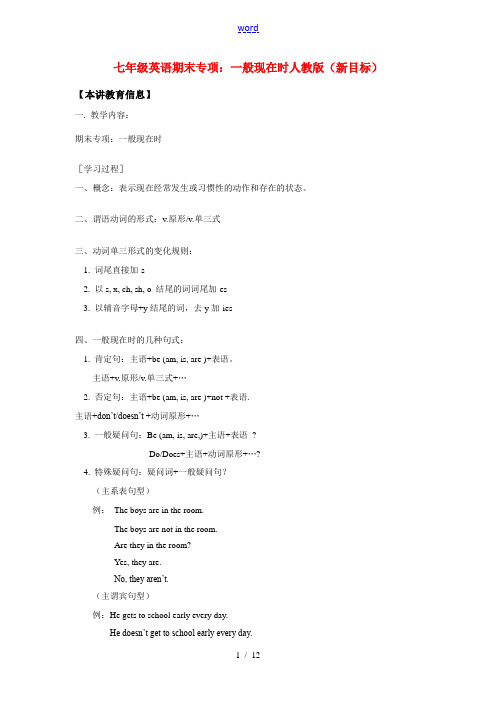
七年级英语期末专项:一般现在时人教版(新目标)【本讲教育信息】一. 教学内容:期末专项:一般现在时[学习过程]一、概念:表示现在经常发生或习惯性的动作和存在的状态。
二、谓语动词的形式:v.原形/v.单三式三、动词单三形式的变化规则:1. 词尾直接加-s2. 以s, x, ch, sh, o 结尾的词词尾加-es3. 以辅音字母+y结尾的词,去y加-ies四、一般现在时的几种句式:1. 肯定句:主语+be (am, is, are )+表语。
主语+v.原形/v.单三式+…2. 否定句:主语+be (am, is, are )+not +表语.主语+don’t/doesn’t +动词原形+…3. 一般疑问句:Be (am, is, are,)+主语+表语?Do/Does+主语+动词原形+…?4. 特殊疑问句:疑问词+一般疑问句?(主系表句型)例:The boys are in the room.The boys are not in the room.Are they in the room?Yes, they are.No, they aren’t.(主谓宾句型)例:He gets to school early every day.He doesn’t get to school early every day.Does he get to school early every day?Yes, he does.No, he doesn’t.五、基本用法:1. 表示经常发生或习惯性的动作,常与always, often, usually, sometimes, every day (morning…), in the morning (afternoon, evening), on Monday (Saturday)等表示频度的时间状语连用。
always, usually, often 和sometimes这四个副词表示行动或动作的频率。
- 1、下载文档前请自行甄别文档内容的完整性,平台不提供额外的编辑、内容补充、找答案等附加服务。
- 2、"仅部分预览"的文档,不可在线预览部分如存在完整性等问题,可反馈申请退款(可完整预览的文档不适用该条件!)。
- 3、如文档侵犯您的权益,请联系客服反馈,我们会尽快为您处理(人工客服工作时间:9:00-18:30)。
studies
不规则变法:
• have has
给出下列动词的第三人称单数
• talk__t_a_lk_s_forget_fo_r_g_e_ts___hopheo_p_e_s___ • stop__s_to_p_s_performp_e_rf_o_r_m_s___play__p_la_y_s_
2.实义动词的一般现在时句式: (1) 主语为第一人称(I, we)、第二人称单复数(you),第三
人称复数(they)等. 【非单数第三人称】 肯定句: ☺主语(I/We/You/They)+实义动词+其他
e.g. I watch TV on Saturdays.
They play sports every day. 否定句: ☺主语(I/We/You/They)+do+ not+动词原形+其
☺一般疑问句:Be+主语+表语?
e.g. Is he a worker? Yes, he is./No, he isn’t. Are you thirteen? Are they in the classroom? Yes, they are. No, they aren’t.
Be的用法口诀 I用am; you 用are, is连着he, she,it; 单数名词用is,复数名词全用are。
_____________________
按照要求改写句子
• 1. Daniel watches TV every evening.(改为否定句) Daniel doesn’t watch TV every evening.
• 2. I do my homework every day.(改为一般疑问句,
• 按要求做题: (10分)
• 1.He _h_a_s___(have) a notebook.
• 2.Maria and I_h_a_v_e___(have) a basketball.
• 3.Li Ping has a soccer ball.(变为一般疑问句)
• Doe__s__Li Ping have____a soccer ball?
一般现在时练习题
Exercises:
• 用do, don’t, does, doesn’t填空。
• 1. ___D__o___you have a soccer ball? • Yes, I _____d_o______. • 2. ___D__o_e_s____ Dave have a tennis
定回No答, )she doesn’t .
_____________________
4.WHee hhaavse sommeenniciceepipcitcutruerse.(.主语改为 he)
_____________________
5D.oAenns hAansna hbaasvkeetabalbl.(a改sk一e般tb疑all问? 句)
他
e.g. I don’t play sports on Saturdays. They don’t play sports every day
一般疑问句: ☺Do+主语(I/we/you/they)+动词原形+其他?
e.g. Do you watch TV on Saturdays? Do they play sports every day?
期末专项复习(三)
一般现在时
一般现在时(The Simple Present Tense)
1.表示现在的状态: e.g. He’s twelve. She’s at work.
2.表经常或习惯性的动作: e.g. I get up at 6:30 every day. He reads English every morning.
否定句: I don’t have a basketball.
Exercises:
把下面的句子变一般疑问句并作肯、否定回 答,否定句.
1.I have a book. 2.They have a volleyball . 3.His brothers have many CDs. 4.I have a bat. 5.This is my soccer.
2.实义动词的一般现在时句式: (2)主语为第三人称单数【he, she, it等】 肯定句:
☺主语(He/She/It)+实义动词单三形式+其他
e.g. He watches TV at home on Saturdays.
Lucy plays sports every day. 否定句:
☺主语(He/She/It)+does +not+动词原形+其他
• say__s_a_y_s_buy_b_u_y_s__ worry__w_o_r_ri_e_s_
• fly__f_li_e_s_studys_t_u_d_ie_s__like___lik_e_s__ • makem_a_k_e_s__taktea_k_e_s___love__l_o_v_e_s_ • recite_r_e_ci_te_s__becombe_co_m__e_s___cocmoem_e_s____ • drive__d_ri_v_e_s_shines_h_i_n_e_s__leavele_a_v_e_s___ • wake_w__a_ke_s__ride_r_id_e_s___writew__ri_te_s___
• 4.Does she have a CD?(做肯定回答)
• Yes ,shedoes____ .
• 5.He has a baseball bat.(变否定句)
• He doe__s_n_’t__h_a_v_e___a baseball bat.
• 6.You have a volleyball.(一般疑问句)
_____________________ 2W.We deohna’tvehavbeigaTbVigsTeVt inseotuinr hoouursheo.u(改se为. 否定句) _____________________ 3.Does she have any English-Chinese dictionary?(作否
3.表主语具备的性格和能力等: e.g. She likes noodles. They speak French.
4.普遍真理和自然规律: e.g. Two plus four is six. The moon goes around the earth.
1.be 动词的一般现在时的句式: ☺肯定句:主语+be+表语(n., adj.等)
• 5. We play volleyball every morning.(改为否定句)
We don’t play volleyball every morning. • 6. He plays soccer very well.(改为否定句)
• Yes, they___d_o____________.
• 6. ___D__o______your brothers have a basketball?dNoon, ’tthey ____________.
• 7. __D_o__e_s_____ your father have a car? • No, he_d_o__e_s_n_’_t____. • 8. ____D__o_____Lin Tao and Yang Ming have a
变疑问,往前提,句末问号莫丢弃。 变否定,更容易,be后not莫忘记。 疑问否定任你变,句首大写莫迟疑.
Exercises:
把下列句子变否定句,一般疑问句并作肯 否定回答:
1.It is a red pen. 2.He is Eric. 3.That is my map. 4.Her name is Mary. 5.I am Jenny.
肯定回答:Yes,主语(he/she/it)+does 否定回答: No, 主语(he/she/it)+doesn’t
She has a book.
一般疑问句: Does she have a book? 肯定回答: Yes, she does. 否定回答: No, she doesn’t.
否定句: She doesn’t have a book.
• _D__o___you have a volleyball? • 7.The boy doesn’t have a TV.(肯定句)
• The boy _h_a_s___ a TV.
• 按要求完成句子(10分) 1. .She has a lot of work to do this week.(改为一般疑 Doe问s 句sh)e have a lot of work to do this week?
动词单三形式规则变法:
情况
一般情况
以s, sh ,ch ,x,o等
结尾的词 以辅音字母 +y结尾的词
构成方法 加- s
加-es 变y 为i再
加-es
读音
清辅音后读 [s]
浊辅音和元 音后读[z]
读[iz] 或[z]
读[z]
例词
likes gets finds
goes, teaches, watches
e.g. He doesn’t play sports on Saturdays. Lucy doesn’t play sports every day
• 一般疑问句:
☺Does+主语(he/she/it)+动词原形+其他?
e.g. Does he watch TV on Saturdays? Does Lucy play sports every day?
